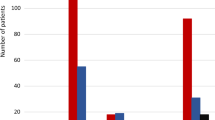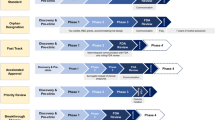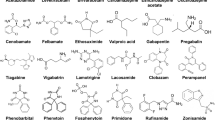Abstract
Rationale
While meta-analyses of clinical trials found that lurasidone and partial dopamine agonists (brexpiprazole and aripiprazole) were the antipsychotics less likely to cause QTc prolongation, and sertindole, amisulpride, and ziprasidone were the most frequently associated with this adverse drug reaction; no real-world studies have investigated this risk between the different antipsychotics.
Objectives and methods
Using data recorded from 1967 to 2019 in VigiBase®, the World Health Organization’s Global Individual Case Safety Reports database, we performed disproportionality analysis to investigate the risk of reporting QT prolongation between 20 antipsychotics.
Results
Sertindole had the highest risk of reporting QT prolongation, followed by ziprasidone and amisulpride. Lurasidone was associated with the lowest risk. First-generation antipsychotics were associated with a greater QT prolongation reporting risk (ROR, 1.21; 95%CI, 1.10–1.33) than second-generation antipsychotics. A positive correlation was found between the risk of reporting QT prolongation and affinity for hERG channel (R2 = 0.14, slope = Pearson coefficient = 0.41, p value = 0.1945).
Conclusions
This large study in a real-world setting suggests that sertindole and ziprasidone were the antipsychotics drugs associated with the highest risk of QT prolongation reporting. Our results suggest that lurasidone is less associated with QT interval prolongation reports. Our study also suggests that antipsychotics with the higher hERG affinity are more associated with to QT prolongations reports.


Similar content being viewed by others
References
Brunton L, Hilal-Dandan R, Knollmann B (2017) The pharmacological basis of therapeutics. 13th edition. Goodman and Gilman’s
Faillie JL (2018) Case-non case studies: principles, methods, bias and interpretation. Therapie 73(3):247–255
Hazell L, Raschi E, De Ponti F, Thomas S, Salvo F, Ahlberg Helgee E, Boyer S, Sturkenboom M, Shakir S (2017) Evidence for the hERG liability of antihistamines, Antipsychotics, and anti-infective agents: a systematic literature review from the ARITMO project. J Clin Pharmacol 57(5):558–572
Huhn M, Nikolakopoulou A, Schneider-Thoma J, Krause M, Samara M, Peter N, Arndt T, Backers L, Rothe P, Cipriani A, Davis J, Salanti G, Leucht S (2019) Comparative efficacy and tolerability of 32 oral antipsychotics for the acute treatment of adults with multi-episode schizophrenia: a systematic review and network meta-analysis. Lancet 394(10202):939–951
Kahl KG (2018) Direct and indirect effects of psychopharmacological treatment on the cardiovascular system. Horm Mol Biol Clin Investig 36(1). https://doi.org/10.1515/hmbci-2018-0054
Molokhia M, Pathak A, Lapeyre-Mestre M, Caturla L, Montastruc JL (2008) Case ascertainment and estimated incidence of drug-induced long-QT syndrome: study in Southwest France. Br J Clin Pharmacol 66(3):386–395
Montastruc JL, Benevent J, Montastruc F, Bagheri H, Despas F, Lapeyre-Mestre M, Sommet A (2019) What is pharmacoepidemiology? Definition, methods, interest and clinical applications. Therapie 74:169–174
Thomas SHL, Behr ER (2016) Pharmacological treatment of acquired QT prolongation and torsades de pointes. Br J Clin Pharmacol 81(3):420–427
Tisdale J, Chung M, Campbell K, Hammadah M, Joglar J, Leclerc J, Rajagopalan B, American Heart Association Clinical Pharmacology Committee of the Council on Clinical Cardiology and Council on Cardiovascular and Stroke Nursing (2020) Drug-induced arrhythmias: a scientific statement from the American Heart Association. Circulation 142(15):e214–e233
Author information
Authors and Affiliations
Corresponding author
Ethics declarations
Conflict of interest
The authors declare no competing interests.
Additional information
Publisher's note
Springer Nature remains neutral with regard to jurisdictional claims in published maps and institutional affiliations.
Rights and permissions
Springer Nature or its licensor (e.g. a society or other partner) holds exclusive rights to this article under a publishing agreement with the author(s) or other rightsholder(s); author self-archiving of the accepted manuscript version of this article is solely governed by the terms of such publishing agreement and applicable law.
About this article
Cite this article
Bordet, C., Garcia, P., Salvo, F. et al. Antipsychotics and risk of QT prolongation: a pharmacovigilance study. Psychopharmacology 240, 199–202 (2023). https://doi.org/10.1007/s00213-022-06293-4
Received:
Accepted:
Published:
Issue Date:
DOI: https://doi.org/10.1007/s00213-022-06293-4




